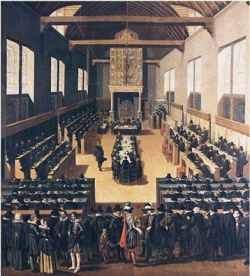 “Who is Like the Beast?”–The Counterfeit Trinity of Revelation 13
“Who is Like the Beast?”–The Counterfeit Trinity of Revelation 13
Even a cursory reading of the thirteenth chapter of the Book of Revelation reveals three distinct foes of Jesus Christ–the dragon, who stands on the shore of the sea and gives the first beast from the sea his power, throne, and authority (vv. 1-2); and yet another beast, which comes out of the earth (v. 11). The function of this second beast (called the "false prophet" in Revelation 16:13) is to entice people to worship the first beast.
The identity of these three figures, along with their overt blasphemy against the most high God means that what is primarily in view is not so much John’s interest in contemporary Roman history and politics (a particular emperor), but that John's vision depicts another battle in the on-going war between the two seeds (Christ and the Antichrist), in this case, the godless character of Roman rule and the empire's on-going persecution of Christians.
What is recorded in Revelation 13 reflects the fact that a dramatic turning point in the history of redemption has already taken place with the coming of Jesus Christ. Through our Lord’s death and resurrection, the dragon has already been decisively defeated by the Messiah (cf. Colossians 2:15). Although our salvation has been secured through Christ’s death upon the cross, and through his resurrection from the dead, the dragon is enraged by his defeat and consequently wages war upon the saints (Revelation 13:7) because he knows his time is short (Revelation 12:12).
The Book of Revelation, therefore, depicts an already defeated foe waging his last desperate efforts in a war he knows he has already lost. In this final attempt to escape his inevitable fate, the dragon now enlists the aid of two beasts to do his bidding, one from the sea (Revelation 13:1-10) and one from the land (Revelation 13:11-18). While the final outcome is never in doubt, the particular circumstances which bring us to the climatic end of redemptive history have long fascinated God’s people.
Critical to understanding John’s vision in Revelation 13 is his statement that the first beast has “ten horns and seven heads, with ten crowns on his horns, and on each head a blasphemous name (v. 1).” This beast “resembled a leopard, but had feet like those of a bear and a mouth like that of a lion. The dragon gave the beast his power and his throne and great authority.” This immediately harkens any reader who was familiar with the Old Testament back to Daniel’s vision of a great beast in Daniel 7:7, who is ultimately slain (Daniel 7:11) and who is conquered by the son of man and his everlasting kingdom (Daniel 7:13-14). Not only does the beast of John’s vision possess military power second to none– “Who is like the beast? Who can make war against him?” (v. 4a)–but when “one of the heads of the beast seemed to have suffered a fatal wound, the fatal wound had been healed. The whole world was astonished and followed the beast (v. 3).”
This obvious parody of Christ’s resurrection (cf. H. B. Swete, The Apocalypse of St. John, Macmillian, 1907, lxxxiv), coupled with the military prowess and deceptive ways of the beast, gives the dragon exactly what he craves. “Men worshiped the dragon because he had given authority to the beast (v. 4b).” Not only did men worship Satan because of the might of the beast, “they also worshiped the beast.” Clearly, then, what is in view is a state (government) which is empowered by Satan, and which claims divine rights and prerogatives for itself. Bauckham is quite correct when he calls this a “deification of power,” in which military power (perhaps we could add economic power as well) masks the inevitability of the beast’s destruction by Christ and his kingdom (Bauckham, The Climax of Prophecy, 451).
The overtly antichristian nature of this reign of this beast can be seen in what follows. “The beast was given a mouth to utter proud words and blasphemies and to exercise his authority for forty-two months,” the forty-two months most likely a reference to the inter-advental age (Beale, The Book of Revelation, 695; Sweet, Revelation, 210-211). Taken from Daniel 7:25b (and from Daniel 12:7), this same period of time appears in the preceding chapters of the Book of Revelation. In Revelation 11:2-3, the Gentiles are said to trample the holy city (the church–i.e., the dwelling place of God in the new covenant–cf. Beale, The Book of Revelation, 570) for forty-two months, and for 1,260 days. This is the same time period in which the two witnesses proclaim the gospel (Revelation 11:3). In Revelation 12:6, John refers to the time of the protection of the woman in the wilderness (the church) as spanning 1,260 days, and then again later as “a time, times, and half a time” (v. 14). As Beale points out, these are all references to the same period of time, indicating that the manifestation of the beast likewise “spans the time from Christ’s death and resurrection to the culmination of history”(Beale, The Book of Revelation, 695).
This means that the beast’s efforts to oppose the gospel extends from the time of the Neronian persecution into the present, and will continue until the end of the age, when the beast is destroyed by Jesus Christ at his second advent (Revelation 20:10).
In Revelation 13, we read that the beast “opened his mouth to blaspheme God, and to slander his name and his dwelling place and those who live in heaven (v. 6).” This is a vision of a government which not only takes divine rights and prerogatives unto itself (i.e. worship), but this government and its leaders speak great blasphemies against Christ and his kingdom. This can be seen in the fact that the beast wears crowns with blasphemous names, thereby assuming the prerogatives of deity. This imagery is quite significant in helping us to understand the beast’s identity. When coupled to the obvious reference to a counterfeit Trinity (the dragon, a the first beast, and a second beast who is the false prophet), what is in view is a satanic parody of the Truine God, as well as a satanic parody of our redemption (the death and burial, the resurrection and the parousia of Christ), when the beast is killed, and then comes back to life to begin its reign of terror all over again (Beale, The Book of Revelation, 687-694; Caird, The Revelation of St. John, 161-166; Sweet, Revelation, 206-209).
John’s point is that when empowered by the dragon, the state oversteps its bounds and deifies itself and/or its leader. As Caird puts it, “all political power is the gift of God; but when men deify the state, either directly by a religious cult or indirectly by demanding for it the total loyalty and obedience that is due to God alone, it ceases to be human and becomes bestial” (Caird, The Revelation of St. John, 162). What is in view then is primarily an anti-christian power, centered in the seat of government, using the resources of that government against Christ’s church in an effort to thwart the preaching of the gospel.
____________________________________
For more information, Click here: Riddleblog - Man of Sin - Uncovering the Truth About Antichrist
 Monday, May 19, 2008 at 07:26AM
Monday, May 19, 2008 at 07:26AM  Here's the audio from Ken Samples' series "A Little Lower than the Angels."
Here's the audio from Ken Samples' series "A Little Lower than the Angels."









